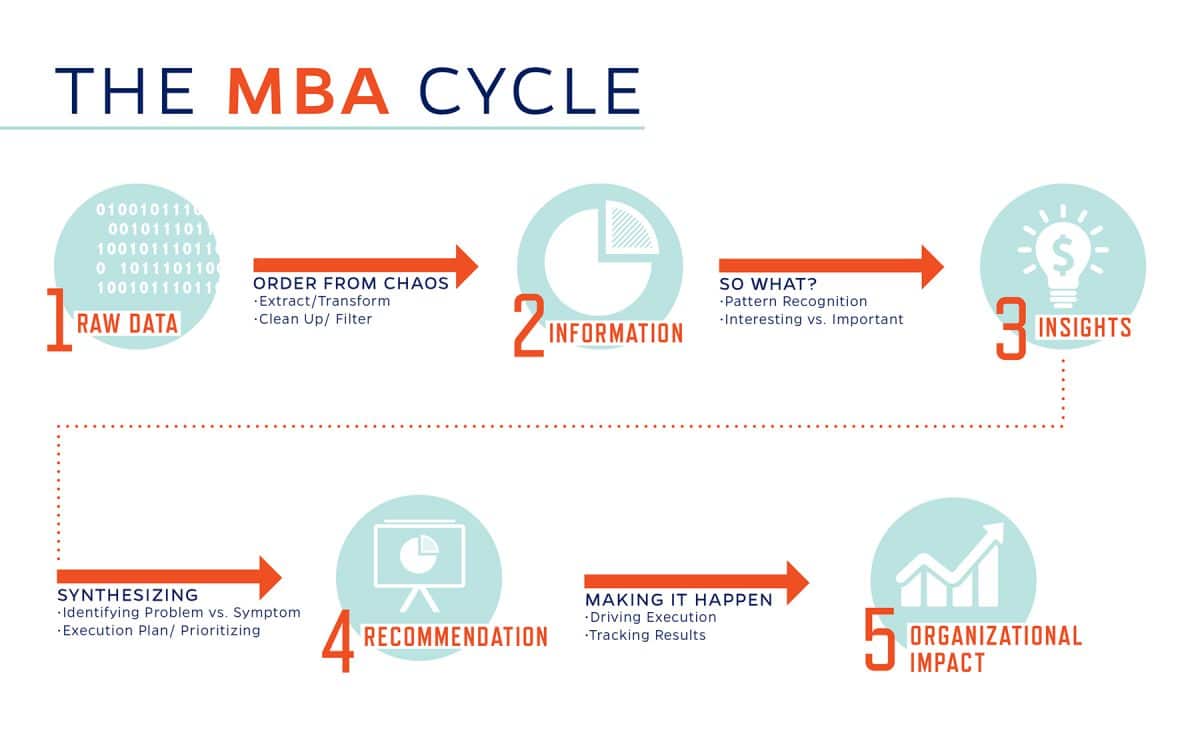Stand out to recruiters with these MBA skills
UF MBA candidates land roles after graduation across a wide range of functions and industries, and each company has different priorities when assessing candidates. However, there are a consistent set of skills that every MBA student should possess, whether he or she is pursuing roles in strategy, corporate finance, marketing, or human capital.
Most companies today have more data than they know what to do with – every click on a website, every bag of apples purchased at the grocery store, and every ride-share destination ever used is stored somewhere. The catch is how to make something useful out of that data, translating it into decisions that can positively impact the company’s strategic objectives. Jason Rife, Director of Graduate Business Career Services at the Warrington College of Business, and the Business Career Services team refer to this process as the MBA Cycle. Read more from Jason about how UF MBA teaches students to think through and apply the MBA Cycle to demonstrate their value to recruiters.

Data –> Information
The first step in the process involves finding the data, extracting it and “cleaning it” to get it into a useful format. The skills required at this phase are both technical and non-technical. On the technical side, it typically takes the form of Excel, the Swiss Army knife of the MBA world. Whether you use Excel, SQL, SAP, or some other tool, you need to be comfortable manipulating large blocks of data.
On the non-technical side, you often find yourself in situations in which there are gaps in the data or the data isn’t exactly what you want. Demonstrating a logical, yet creative, thought process by identifying alternative data sources or data modifications can get MBAs past road blocks that would bring others to a dead stop on their project.
Information –> Insights
You’ve got the data in a format you can use, and now you need to identify trends and patterns. Technical skills again play a part as you must use the analysis/data visualization components of tools like Excel and Tableau. You also need to show judgement by separating what is interesting versus what is important. For example, if your company’s most frequent purchasers are suburban mothers between the ages of 28 and 32 in central Iowa, is there anything you can do with that information? Are there enough of them there to justify the expense of a targeted marketing campaign? Adapting information into insights is a key skill that sets MBAs apart.
Insights –> Recommendation
This is where we start to separate the rock stars from the groupies. You’ve learned a great deal from the data, but now you must figure out how to translate those insights into a series of actions that will help the company take advantage of your findings AND explain it to someone in a fraction of the time it took you to develop your own understanding of the issues.
No single skill will get you farther in the business world than the ability to make the complex simple. Can you tell a story with your data to an audience of senior leaders, securing their support? On the technical side, this is typically accomplished with a PowerPoint-like tool. You need to know how to build a professional slide deck and then possess the presentation skills necessary to deliver your idea and defend it without appearing defensive. Never underestimate the power of strong communication skills.
Recommendation –> Organization Impact
The filing cabinets and electronic repositories of the world are filled with proposals that were never implemented. MBAs need to be able to form teams of often diverse individuals to accomplish tasks. Can you break a complex objective down into a discrete series of steps, prioritize them and then assign the right person the right task? Can you motivate those people to execute the deliverables to a high standard, providing constructive feedback along the way? Can you establish and track performance metrics to know whether you are succeeding, and can you deal with the inevitable surprise that can pop up and challenge everything? Anyone can come up with proposals. MBAs make those proposals happen.
These are all skills that are expected from an MBA, whether you are looking to be a Strategy Consultant with Accenture or a Procurement Director with Anheuser-Busch InBev. Fortunately, these are exactly the sort of skills we develop and grow within the UF MBA program through coursework with our world-class faculty and experiential learning activities. In Business Career Services, we help you identify past experiences in which you demonstrated these skills and develop them into a compelling narrative that will resonate with recruiters.
Jason Rife is Director of Graduate Business Career Services. Before transitioning into career services, Jason spent a decade in private sector project management, corporate finance, marketing and strategy roles with ExxonMobil, John Deere, and McKinsey & Company. His love of recruiting and coaching students led him to make the jump to career services at UF, where he now teaches students how to tell their story to companies and helps companies recruit talented students. When he’s not advising students, he’s working with his team to identify ways to enhance BCS’s service model or coaching case competition teams on how to build and deliver presentations to corporate executives. You can read more about his background in Jason’s LinkedIn profile.
Want to learn more about how thinking like an MBA candidate can land you the job you want from Jason and the Business Career Services team? Request information about how UF MBA can transform your thinking and your career.




